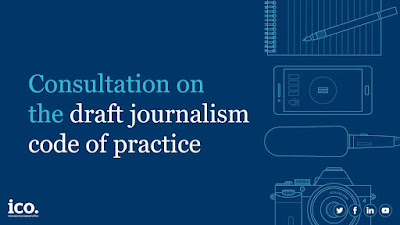Principally and ostensibly, the code is intended to bring media law into conformity with U.K. data protection law, essentially the European General Data Protection Regulation (GDPR), including the stories "right to be forgotten," or right to erasure (RTBF). On the ground, the picture is more complicated. The British phone hacking scandal and following Leveson Inquiry constitute a strong causal thread in public receptiveness to media regulation.
Cambridge legal scholar David Erdos analyzed the draft code for the INFORRM public in part one and part two postings in October. The code incorporates media torts such as defamation of privacy and misuse of private information (MOPI), the latter a common law innovation of British courts to facilitate enforcement of data protection rights. I have posited in other venues that common law tort similarly might provide a way forward to fill gaps in information privacy law in the United States.
Journalism and data protection rights have been on a collision course for a quarter century, like a slow-motion car wreck, and the draft journalism code is a harbinger of the long anticipated impact. Back in 1995, when the EU GDPR-predecessor Data Protection Directive was brand new, the renowned media law scholar Jane Kirtley published an article in the Iowa Law Review, "The EU Data Protection Directive and the First Amendment: Why a 'Press Exemption' Won't Work." Kirtley foresaw data protection and the First Amendment's arguably irreconcilable differences before most U.S. scholars had even heard of data protection.
In those innocent days, journalism ethics was reshaping itself to preserve professionalism in the newly realized and anxiety-inducing 24/7 news cycle. A key plank in the new-ethics platform was its essentiality to resist regulation. In 2000, media law attorney Bruce Sanford published the book Don't Shoot the Messenger: How Our Growing Hatred of the Media Threatens Free Speech for All of Us. Then in 2001, everything changed, and mass media and their consumers became engrossed by new concerns over government accountability.
In a way, the consolidation of media regulation in a generation of code could be a relief for journalism, especially on the European continent. In an age of ever more complex regulatory mechanisms, codification can offer bright lines and safe harbors to guard against legal jeopardy. Information service providers from local newspapers to transnationals such as Google are struggling to comply with new legal norms such as the RTBF, and there is as yet little evidence of uniformity of norms, much less convergence. Yet even if industry ultimately embraces the security of code, what's good for business is not necessarily good for wide-ranging freedom of expression.
Courts, too, are struggling with novel problems. For example, in late November, the European Court of Human Rights ruled in Biancardi v. Italy that RTBF de-indexing orders extend beyond search engines and bind original news publishers. Writing for Italian Tech and INFORRM, attorney Andrea Monti fairly fretted that the decision effectively compels journalistic organizations to expend resources in constant review of their archives, else face liability in data protection law. The result, Monti reasoned, will be to discourage preservation, manifesting a threat to the very existence of historical record.
On the one hand, it's foolish to wring one's hands for fear that journalism is being newly subordinated to legal regulation. Tort itself is a regulatory mechanism, and defamation has been around for a long time, notwithstanding the seeming absolutism of the First Amendment. On the other hand, media regulation by law looks nothing like the punctilious supervision of regulated industries, including the practice of law.
In my own education, I found the contrast in approaches to ethics perplexing. In journalism school, my ethics class had been taught aptly by a religion scholar who led impassioned discussions about handout hypotheticals. In law school, the textbook in legal profession hit the desk with a thud for what was as much a study of model or uniform code as was crim or sales.
With no "First Amendment" per se, media regulation by code is not the novelty in the U.K. that it would be in the United States. Still, with privacy and digital rights sweeping the globe, law is poised to regulate journalism in new ways everywhere, whether through the subtlety of common law or the coercive power of civil regulation. American courts will not be able to escape their role in reshaping fundamental rights for the digital world, as European courts are at work doing now. Kirtley foresaw the issues in 1995, and the chickens are slowly but surely turning up at the roost.
The present ICO consultation closes on January 10, 2022.

No comments:
Post a Comment